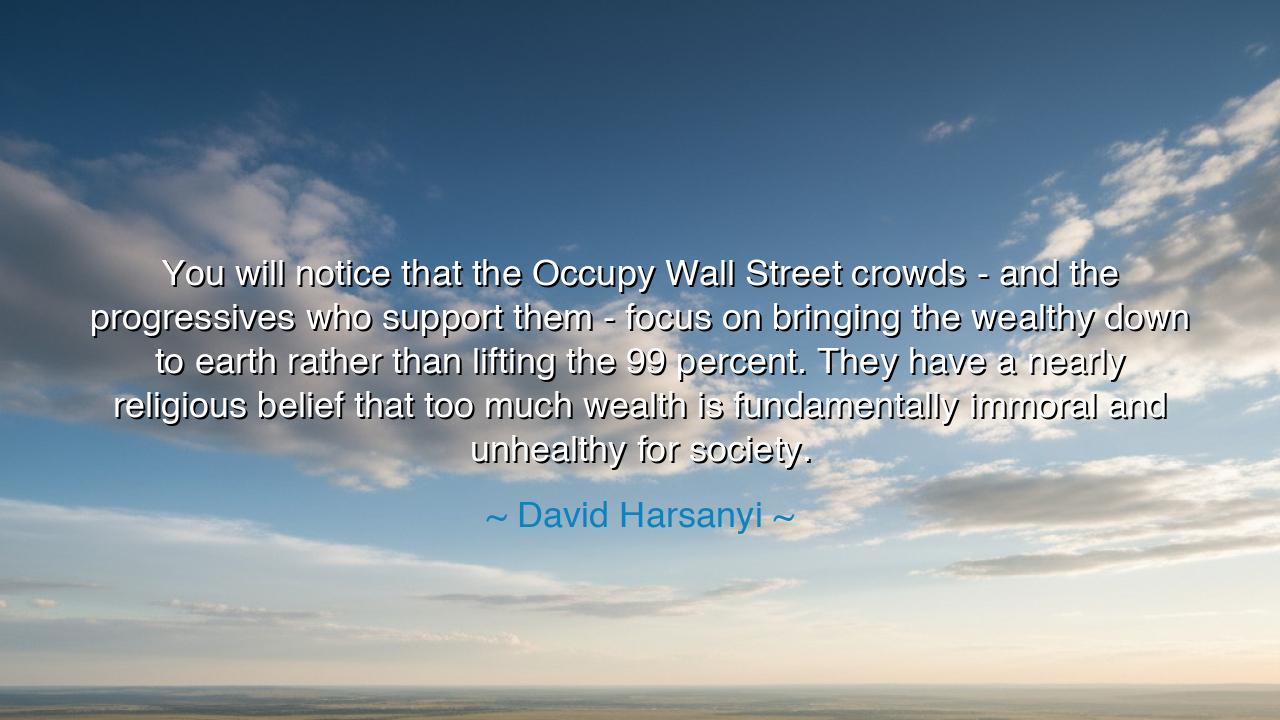
You will notice that the Occupy Wall Street crowds - and the
You will notice that the Occupy Wall Street crowds - and the progressives who support them - focus on bringing the wealthy down to earth rather than lifting the 99 percent. They have a nearly religious belief that too much wealth is fundamentally immoral and unhealthy for society.






Hear now the words of David Harsanyi, who declared: “You will notice that the Occupy Wall Street crowds—and the progressives who support them—focus on bringing the wealthy down to earth rather than lifting the 99 percent. They have a nearly religious belief that too much wealth is fundamentally immoral and unhealthy for society.” This statement is both a mirror and a challenge. It reflects a conflict deep in the heart of civilization: shall the people spend their strength tearing down those above them, or shall they rise together by building their own ladders? Shall wealth be viewed as a curse, or as a tool to be tempered and directed toward the common good? In these words lies an age-old tension between envy and aspiration, between destruction and creation.
The origin of this saying lies in the tumult of the early 21st century, when crowds gathered beneath the towers of commerce in New York City, chanting against the excesses of banks and financiers. This movement, known as Occupy Wall Street, cried out against the power of the few—the “1 percent”—who held vast sums while the many struggled. Harsanyi, a voice of skepticism, observed that their passion was not solely for raising the poor, but for humbling the rich. To him, this crusade bore the qualities of a religious belief, a moral judgment upon wealth itself, as though abundance were inherently corrupting. His words remind us of a truth the ancients often grappled with: when does the pursuit of justice turn into the hunger for vengeance?
The ancients offer us both warning and wisdom. Recall the tale of Sparta and Athens. Sparta valued equality among its warriors, but it did so by crushing individuality and shunning wealth, binding every man to a life of harsh sameness. Athens, by contrast, opened its gates to commerce, art, and enterprise, allowing wealth to flourish alongside ideas. Yet Athens too discovered the danger of excess, when greed and corruption tore at the fabric of its democracy. Both extremes reveal the dilemma: wealth may become a tyrant if left unchecked, but envy may become a poison that consumes all progress.
Consider also the story of the French Revolution, when cries of equality filled the air. At first, the people sought bread, dignity, and justice. But as the storm grew, the guillotine became their altar, and the heads of the wealthy their sacrifices. In their zeal to humble the rich, they unleashed terror that devoured not only aristocrats but also their fellow citizens. The lesson is searing: when anger against the powerful eclipses the vision for lifting the powerless, society risks replacing tyranny with chaos, oppression with blood.
Yet, we must not dismiss the cry of the Occupy movement as mere envy. Their voices gave form to a real wound: the chasm between wealth and poverty had grown too vast, and corruption had indeed corroded trust. Their passion revealed that a society where wealth is hoarded by a few while the many languish is brittle, and will one day fracture. Harsanyi’s critique, therefore, is not a rejection of their cause, but a call to examine its spirit. True justice does not come from dragging others down into the mud, but from raising the multitude into the light.
The meaning of this quote, then, is not a condemnation of reform but a warning against bitterness. Wealth itself is not the root of evil, but the misuse of wealth, the idolatry of wealth, the hoarding of wealth at the expense of humanity. To despise abundance is to despise the very possibility of flourishing; to sanctify abundance without conscience is to invite ruin. Wisdom lies in balance: lifting the 99 percent through opportunity, education, and fair governance, while ensuring the wealthy wield their power with responsibility and humility.
And what lesson shall we, wanderers of this age, take for ourselves? Do not let envy rule your heart, for envy consumes without building. Instead, channel your strength into creation—lift yourself and others by pursuing skill, knowledge, and community. At the same time, hold the powerful accountable; demand that wealth serve the people, not enslave them. Support policies, leaders, and actions that cultivate opportunity, not division. Thus, the teaching is clear: build, do not only break; lift, do not only pull down; aspire, do not merely condemn. In this way, society may walk the narrow road where both justice and prosperity can endure.
Therefore, let us inscribe this lesson upon our hearts: to build a civilization where the roots of wealth nourish all, not just the few, we must unite aspiration with justice, liberty with compassion. For only when the people rise together, not through envy but through shared creation, will the balance be restored and the future secured.






AAdministratorAdministrator
Welcome, honored guests. Please leave a comment, we will respond soon